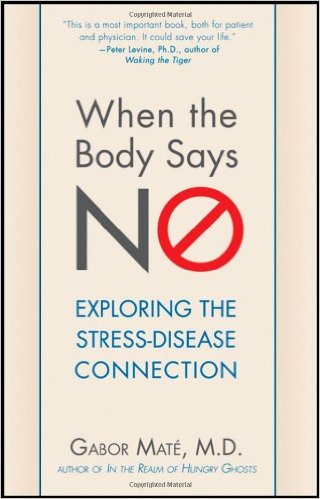 |  | When the Body Says No: The Stress-Disease Connection
Author: Gabor Maté, MD
Publisher: Wiley, John & Sons, Inc. (January, 2011)
Paperback: 320 pages
ISBN-10: 0470923350
ISBN-13: 9780470923351


|
Book DescriptionModern research is confirming the age-old wisdom that emotions are inseparable from our health and physiology. Repressed emotions bring on stress that can lead to disease. In this internationally bestselling book, Gabor Maté draws on cutting-edge science, his decades of experience as a physician, and the stories of famous people including those of Lou Gehrig, Lance Armstrong, Gilda Radner, and Ronald Reagan to examine the role hidden stress plays in an array of diseases, including heart disease, diabetes, irritable bowel syndrome, multiple sclerosis, arthritis, and cancer.
When the Body Says No provides transformative insights into how disease can be the body's way of saying no to what the mind cannot or will not acknowledge—and how we can heal.
About the AuthorGabor Maté, M.D., is a physician, public speaker, and award-winning author. His most recent book,
In the Realm of Hungry Ghosts, expresses his groundbreaking perspective on addictions, while his unique take on ADD is found in his first book,
Scattered.
When the Body Says No has been published in over twelve languages on five continents.
This is truly an excellent book for those of us who internalize far too much stress in our lives.
This is from the website
www.whenthebodysaysno.ca/:Can a person literally die of loneliness? Is there a connection between the ability to express emotions and Alzheimer's disease? Is there such a thing as a "cancer personality"? Questions such as these have long surrounded an often controversial debate regarding the connection between the mind and the body in illness and health. As ongoing research is revealing, repressed emotions can frequently lead to stress—which, in turn, can lead to disease.
Provocative and beautifully written,
When the Body Says No provides the answers to these and other important questions about the effects of stress on health. In clear, easy-to-follow language, Dr. Gabor Maté lucidly summarizes the latest scientific findings about the role that stress and individual emotional makeup play in an array of diseases, including heart disease, diabetes, irritable bowel syndrome, multiple sclerosis, arthritis, cancer, and ALS, among others.
Offering profound insights into the link between emotions and disease,
When the Body Says No explores the highly debated effects of stress on health—particularly of the hidden stresses we all generate from our early programming. Dr. Gabor Maté explains how, when the mindbody connection is not optimal, various illnesses can crop up—everything from heart disease and eczema to irritable bowel syndrome and ALS. He presents the scientific evidence that a connection exists between the mind and the immune system—along with illuminating case studies from his years as a family practitioner that reveal how one’s psychological state before the onset of disease may influence its course and final outcome.
As Dr. Maté wrote in The Globe and Mail: “When we have been prevented from learning how to say no, our bodies may end up saying it for us.” When emotions are repressed, this inhibition disarms the body’s defenses against illness. And, in some people, these defenses go awry, destroying the body rather than protecting it. Despite a rapidly accumulating body of evidence attesting to the mind-body unity, most physicians continue to treat physical symptoms rather than persons.
When The Body Says No argues persuasively that we must begin to understand the mindbody link in order to learn more about ourselves and take as active a role as possible in our overall health.
Dr. Maté explains how the dynamics of self-repression operate in all of us. With the help of dozens of moving and enlightening case studies and vignettes drawn from his two decades as a family practitioner, he provides poignant insights into how disease is often the body's way of saying "no" to what the mind cannot or will not acknowledge. Above all,
When the Body Says No promotes learning and healing and helps improve physical and emotional self-awareness—which, Dr. Maté asserts, is at the root of much of the stress that chronically debilitates health and prepares the ground for disease.





 Poll
Poll
